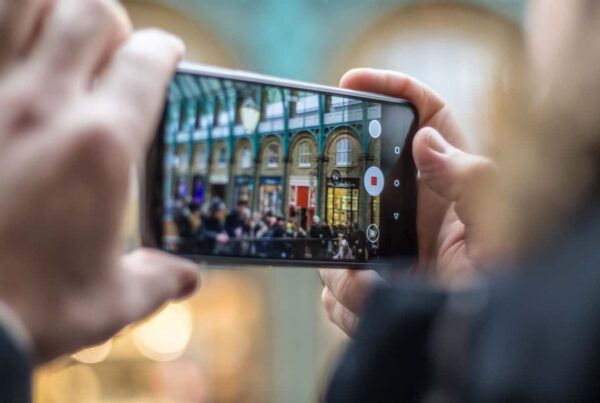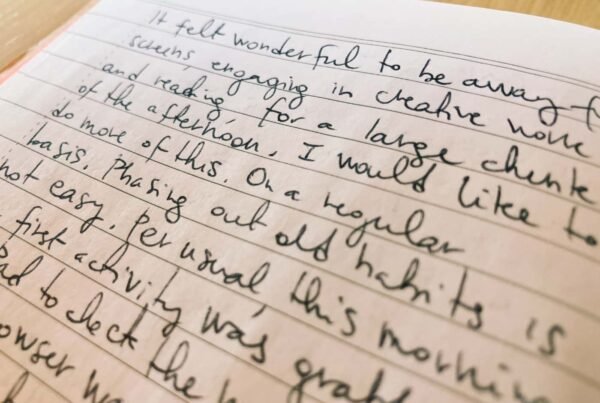Let’s play a game.
It’s 2008. You have a brand new smartphone that is making your life so much easier: from ubiquitous email, to maps and GPS, and the world’s information at your fingertips thanks to its web browser and an internet connection. Just a year ago, when the first generation iPhone came out, the press dubbed it the “Jesus Phone”. It seemed miraculous to have so many tools and features in a small portable device. Exciting times.
Now – remember this is a game – someone approaches you and tells you: “Be very careful of the apps you install on your device. There is a company _______ that will extract and exploit your data, as you go about your day. It will use what you post on it to create a secret psychological profile of you to serve you ads and nudge you towards certain behaviors, as a consumer, and more importantly, as a voter. This company will be deemed responsible for psychological warfare campaigns in many countries around the world. The UN will denounce its role in ethnic cleansing in Myanmar. And there will be many careless leaks exposing your data.”
With all this knowledge, back in 2008, do you think you would use this company’s apps? Not a chance. Of course the company in question is Facebook. As of January 2020, its apps are used by over 2 billion people around the world. And the reason for their popularity is the network effect: most people you know are using them daily. You may despise the company’s ethics, but you find it very difficult to leave.
I’ve got a confession to make. I need to get an issue off my chest that truly bothers me, as someone who cares deeply about privacy and raising awareness about surveillance capitalism. I’m still using WhatsApp – a messaging app acquired by Facebook in 2014. Not a day goes by when I don’t think about deleting my account. Yesterday I spent a few hours doing mental gymnastics about what it would take to really stop using it, but realized that attempts are ultimately futile because… surveillance capitalism. As of January 2020, there is no way to fully escape Facebook’s data mining, unless you ditch your smartphone, computer and iPad… and cut off communication with your friends and family.
Welcome to the Dark Age of the web: the technological nightmare predicted by Orwell, Huxley and Octavia Butler is already here. And I want to resist it. And fight back.
Before we begin, I think it’s important to understand why I think we should care about this issue. I’ve been compiling a list of the top 10 Facebook scandals that have motivated me to distance myself from the company.
1. When a young Mark Zuckerberg called people who gave him access to their data “dumb f-cks”
2. The Cambridge Analytica scandal
3. How Facebook refuses to ban fake political ads
4. When Facebook paid teens to install a VPN… that spied on them
5. Facebook’s role in spreading hate speech and exacerbating ethnic cleansing in Myanmar
6. How Facebook enticed many media companies to make a costly pivot to video – but then it was revealed it inflated video views
7. How Facebook gave third parties access to private user data
8. Facebook’s collection and transcription of private Messenger voice chats
9. Facebook’s secret, non-consensual tracking of non-users
10. The fact that Facebook buys data on users’ offline habits to serve them targeted ads
Leaving Facebook, Instagram… and WhatsApp
I stopped using Facebook two years ago, mostly spurred by the Cambridge Analytica data scandal and the reports about psy-ops on the platform. Leaving it was easy, as I mostly lurked on it and seldom posted any status updates.
I stopped posting to Instagram (owned by Facebook Inc.) in the aftermath of the 2016 US presidential elections. I archived all my posts, deleted Instagram from my phone, and kept the account online but dormant for disambiguation reasons, because there are many people with my name (some posting content I found a bit questionable). In the fall of 2018 I briefly resumed using Instagram, just to post Stories about my new film and my GIPHY stickers. Following an incident related to its creepy ads (which I’ll tell you at another time), I stopped using my personal Instagram account for good. Now I only have a throwaway account that I use to check the quality of my GIPHY stickers. I don’t keep Instagram on my phone: to check a sticker, I download Instagram on my old iPhone 6 or 10 year old iPad Mini, check if the sticker looks good, and then immediately delete the app. I do this sporadically, once every few months.
Now, the last Facebook-owned property remaining on my phone is the messaging app WhatsApp (which is used by 300 million people every day). Because of my interest in privacy and surveillance capitalism, I’m genuinely embarrassed to admit I have it on my phone and I feel that Facebook Inc. can keep tabs on me and gorge precious metadata from my phone thanks to it. Not a day goes by when I don’t fantasize about leaving WhatsApp for good. I turned off microphone, camera and location access but given Facebook’s many many scandals and inexistent code of ethics, I don’t trust it.
I would LOVE to quit WhatsApp. I have over 400 conversations in the app; I use it daily to correspond in groups with my friends, my family, and my husbands’ family. I could easily persuade my parents to switch to the privacy-focused app Signal because hey I’m an only child. My close friends are all very tech savvy and we could easily use another app to talk. But my extended family and my husband’s large family? It’s complicated. In Europe WhatsApp is the de facto standard for text messages and calls. Having to convince many family members to switch to another app is a daunting prospect.
I honestly spent two hours yesterday brainstorming ideas about how I could keep communicating with friends and family over WhatsApp, while maintaining some control over my data. A light bulb went off: I could get a new phone (to overcome device fingerprinting) and a new number. I would then communicate this number to my friends and family and it would be disassociated from my old Facebook identity.
Now please insert a buzzing sound effect for WRONG ANSWER.
Why? I would also have to explicitly ask all my friends and family to register me under a new contact name, possibly with a nickname or pseudonym, otherwise Facebook would immediately know this new number belongs to me. How? WhatsApp can’t work unless you give it permission to access your address book: it constantly scans in the background users’ contacts and uploads this information to its servers. And even though WhatsApp says it is end-to-end encrypted, it mines users’ metadata: the identity of the people you message and the timestamp of the communication. So yes, I could go through the trouble of getting a new phone and a new number, but I would have to trust my friends and family to create a new entry for me in their address book. As I mentioned, I have about 400 active conversations. If just ONE user registers my new number under my real name in their address book, Facebook Inc. would know to link that number to my old, primary number and my identity. GAME OVER.
My mental gymnastics continued: I had another idea. Ok, since I cannot trust other users not to inadvertently give away my number, maybe I would just notify friends and family that I’m leaving WhatsApp for good, delete my account and delete the app from my phone. It would be a bit painful, but, as the Italian saying goes, “chi mi ama mi segua” (“if you love me, you’ll follow me”). Yes, I would probably lose out on many group conversations, but real friends would find a way to message me.
This initially sounded like a better plan… and an upcoming event emboldened me to do it: the prospect of moving to a new apartment. In a month, I will be leaving the apartment where I’ve been for many years. New apartment, new tech habits. I would delete WhatsApp, the last remaining Facebook-owned app from my phone, before moving to the new place, so Facebook would stop mining data from me and wouldn’t even know where I am. Solid plan, right? I feel here we need an even louder buzzing sound effect for WRONG ANSWER. No, that is not how you escape from Facebook’s data mining. Why, you may ask? Because I will be moving to the new apartment with my husband, who will keep using WhatsApp; it’s essential for his job and understandably he doesn’t want to give up hundreds of conversations. So Facebook Inc.’s data gorging would take place under my roof, a few meters away, every day, on a shiny black phone that belongs to the man I love. Our new home wouldn’t be Facebook-free after all. Unless I asked my husband to put and keep his phone in a Faraday bag that cuts off all radio signals, before he left his office every night. Forever. And on weekends. Which would be INSANE and impossible to do.
Now why is this a problem, you may wonder? Facebook knowing my husband’s new residence? Because it would infer where I live too. My husband and I have exchanged thousands of WhatsApp messages over the last five years. Facebook knows our phones are right next to each other every morning and every night, since we live together. A report revealed Facebook collects “GPS location, IP addresses, time zones, Bluetooth signals, nearby Wi-Fi networks” to infer a user’s exact location and serve that user relevant ads. Did you know that Facebook Inc. also maintains “shadow profiles” of users who don’t have a Facebook account and tracks them around the web, creating detailed reports about them?
The Medium user SpiderOak explains further:
Facebook has been the target of multiple class-action lawsuits alleging the company collects this information about non-users without their consent. One recent lawsuit focuses not on email addresses or phone numbers, but instead “face templates”: whenever a user uploads a photo, Facebook scans all the faces and creates a “digital biometric template”. In other words, Facebook is using math to determine who’s who in a picture, based on a scan of your features. If you’re already a user, Facebook can suggest that your friend tag you, but if you’re not a user, Facebook attaches your “face template” information to the same ghost profile with your other contact information on it. Even if you’ve never signed up for Facebook, you may have a profile that contains your contact info and a mathematical template of what you look like nonetheless.
WhatsApp recently started displaying the message “from Facebook” when you fire up the app. You can only see it for a nanosecond, but being a film editor used to spot animations that occur at 1/24th of a second, I catch this flashing message every time. It invariably gives me a queasy feeling.
Facebook, a U.S. based company, earns over 60 BILLION dollars a year off of mining and exploiting the personal data of over 2 billion people around the world. I live thousands of miles away from its headquarters in Menlo Park; I’m in Europe, which introduced data protection policies in 2018. I want Facebook to stop mining my personal data. And yet I can’t escape its predatory reach.
Is there a solution to all this?
Possibly. With appropriate regulation. Some Silicon Valley tech companies currently act like they’re in the Wild West because no political body is holding them accountable. They are free to extract and exploit our personal data, with or without our consent. And if they are caught doing something illegal, the typical fines they face are just a tiny fraction of their annual earnings. Strict regulation – in the U.S. and abroad – could make a real difference. But it would likely take time.
My hope resides elsewhere, in the aforementioned network effect. Facebook, Instagram and WhatsApp are only popular because most people you know are using these platforms. And yet, Facebook’s popularity has been plummeting amongst Gen Z and many of my friends who are a bit older – in their 30s and 40s – have been abandoning it too, out of ethical concerns. Instagram is incredibly popular. But WhatsApp would probably be the easiest app to abandon: there are so many messaging apps out there with the exact same functionalities. Take Signal, for instance. When WhatsApp’s co-founder Brian Acton left Facebook, he even donated 50 million dollars to the Signal Foundation.
What if an event or a group of users sparked a mass exodus away from WhatsApp, towards a more privacy-focused messaging app? The last line of my documentary The Illusionists is “it’s not going to be easy. But it’s definitely going to be worth it.” I feel this applies to this struggle as well. The strive for more control over our personal data.
We often feel powerless to create change, when we are facing corporations that are real behemoths. But change starts from small actions carried out by individuals.
What is a small action I could do today? Well, I could share this post with my friends and loved ones and ask if they are willing to install Signal – and continue speaking with me via that app. I have already purged my phone of most apps; I don’t want to see Whatsapp’s logo on a device that is with me every day. I give myself two weeks to prepare and quit it for good.
Game on.

Click here to subscribe to future blog posts: The Realists on Ghost.






